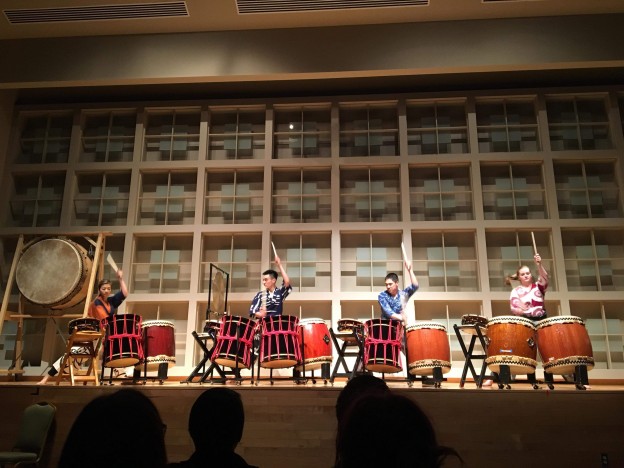“Growing Stronger” was the theme of this year’s East Coast Taiko Conference (ECTC), which was held at Cornell University from February 22nd to 24th. ECTC chose that theme with the hope to enrich participants’ knowledge of taiko and its community through the opportunity to learn the roots of various taiko styles, to strategize ways to improve group performances, and to build community. This conference has occurred annually since 2011, and this year’s conference saw an attendance reach up to about 200 taiko practitioners (collegiate, amateur, and professional).
A contingent of Swarthmore students from the Taiko Repertory class attended this conference, led by Professor Joe Small. These students are Josie Hung ’19, Hunter Lee ’19, Haruka Ono ’19, Shuang Guan ’19, Kira Emmons ’20, Faye Ma ’20, and Jason Wong ’21. This was the first ECTC for Swarthmore students and Professor Small could not have been more excited to bring his students to this year’s gathering. “I am overjoyed that Swarthmore students made the trip and got involved,” Small said. “Certainly one learns a lot from both theory and practice, but taking part in the community is a whole different way of understanding one’s self while learning about the art.”
Guan can attest to Professor Small’s sentiment that participating within a wider community of taiko practitioners is a very different way to practice and to learn taiko. “At Swarthmore, we learn taiko through preparing for one performance piece for the spring concert,” Guan said. “We don’t really get time to talk about the complexity and diversity of taiko, like its sociocultural/political importance, and what doing taiko looks like outside of Swarthmore. ECTC helped to expose me to some of its multitudes, whether that was the different instruments and playing styles of taiko, the different structures and purposes of other taiko groups, or the diverse peoples that are part of taiko.”
At the final concert of the conference, Professor Small, his colleague Isaku Kageyama, Hung, Emmons, and Wong all performed Small’s original composition called “Propel” as the opening performance. The piece is demanding, requiring stamina and technique, but Professor Small is proud of his three students who were able to excel under the pressure. “The audience’s response was an immediate and thunderous standing ovation,” Small said. “The best remark I heard was that it didn’t seem like ‘three students being pulled along by two professionals,’ but a performance where they carried their own weight and that of others.”
Hung felt deeply honored to have shared the stage with such talented and wonderful people, and she was surprised by the audience’s reception. “I did not expect that an opening performance could get a standing ovation,” Hung said. “But it was extremely rewarding getting a standing ovation as the first act of the night and then having various people come speak to us afterwards about being blown away and really enjoying it.”
All of the Swarthmore student attendees found that ECTC generated discussions among themselves about taiko’s relationship to Asian America. “The conference started some discussions among us Swatties about the nuanced ways taiko interacts with identity formation and empowerment, especially within Asian-America, and we’ve continued to have those discussions back at Swat,” Guan said.
At the same time, ECTC was critiqued for not addressing certain issues. “At ECTC, I found myself debating whether or not there should have been more room for critical conversations of taiko, positionality, and identity within the short span of the weekend,” Hung said. “The question is, considering the dynamics and demographics of the Asian American community now and the need to challenge the centralization of East Asians in conversations of Asian American identity and issues, can the taiko community be more inclusive to the wider Asian American community, and if so how?” Hung further extends this question to ask whether taiko can also be inclusive of non-Asian people of color.
Overall, ECTC has been an eye-opening experience for the Swarthmore students in attendance, with some of the seniors now contemplating joining a taiko group after graduation. The conversations about taiko’s relation to race, class, gender, and colonial history still continue today for these students back on campus, especially since Professor Lei Ouyang Bryant offers a seminar called “Taiko and the Asian American Experience.” In that class, students have an opportunity to develop a greater understanding of taiko within historical, cultural, and artistic contexts. Professor Small hopes that attending ECTC will become an annual tradition for Swarthmore students, and that they continue to take part in the greater taiko community even after college.
David Chan ’19
